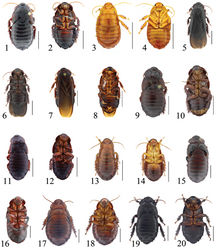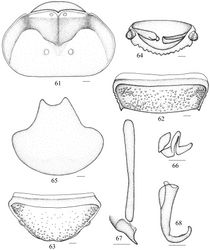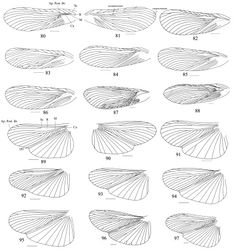Salganea raggei
| Notice: | This page is derived from the original publication listed below, whose author(s) should always be credited. Further contributors may edit and improve the content of this page and, consequently, need to be credited as well (see page history). Any assessment of factual correctness requires a careful review of the original article as well as of subsequent contributions.
If you are uncertain whether your planned contribution is correct or not, we suggest that you use the associated discussion page instead of editing the page directly. This page should be cited as follows (rationale):
Citation formats to copy and paste
BibTeX: @article{Wang2014ZooKeys412, RIS/ Endnote: TY - JOUR Wikipedia/ Citizendium: <ref name="Wang2014ZooKeys412">{{Citation See also the citation download page at the journal. |
Genus: Salganea
Name
Salganea raggei Roth, 1979 – Wikispecies link – Pensoft Profile
- Salganea raggei Roth, 1979: 30.
Description
Male. Body reddish brown, darker caudally, or black (Fig. 15). Eyes black and ocelli yellowish. Antennae, upper lip, mandible, labial palpi and maxillary palpomeres reddish brown. Legs brown, reddish on coxae, trochanter and anterior half of femora. Abdominal sternites reddish brown with the middle of the former several sternites brown (Fig. 16).
Face punctulated and vertex exposed. Ocelli small and round. Anterior margin of pronotum with a V-shaped emargination in the midline, a small recurved tubercle behind the margin on each side of the excision; anterior half depressed, the floor densely granular, lateral area punctate; region behind grooves convex and densely punctate, with one or two pairs of relatively large tubercles on the mounds symmetrically (Fig. 61). Tegmina and wings well developed, sometimes mutilated and remaining an uneven base (Fig. 15). Radius of tegmen with or without 1 long posterior branch which is forked; median vein branched (Figs 87–88). Radial vein of hind wing with one or more branches near the apex, some branches reforked, the posterior branch branched or not; median vein with two branches or simple; cubitus with 7–8 complete and 8–10 incomplete branches (Figs 96–97). Anterior ventral margin of fore femur equipped with 1–3 spines, and with or without a minute distal spine, posterior margin with a large distal spine. Abdominal tergites punctated, the punctures denser laterally and dorsoposteriorly, anterolateral corners usually without holes, rarely with small holes on T6 and T7 only; lateral angle of T6 produced into a rounded and oblique spine; lateral margin of T7 with 5–6 obtuse teeth, laterocaudal angle stout and subacute (Fig. 62). Abdominal sternites densely punctured, S7 with a depression on the caudal margin (Fig. 63), subgenital plate more or less exposed. Supra-anal plate densely covered with coarse punctations, sometimes with minute hairs; hind margin with 8-16 subequal teeth, whose apex obtuse; some teeth contiguous. Cerci bulbous, dorsal surface hairless and ventral surface setose (Fig. 64). Subgenital plate with anterior margin concave, lateral margin with a mesal indentation (Fig. 65). Male genitalia. L1 developed but slightly sclerotized (Fig. 66); L2d not bifurcated, elongate and tapering towards the apex, mostly with a weak concavity in hind margin (Fig. 67); R2 well developed, hook-shaped, apex subacute and curved upwards (Fig. 68).
Female. Differs only slightly from male in partial specimens as follows: anterior margin of pronotum slightly excised, and the tubercles indistinct behind the indentation.
Nymph. Similar to adult, but body yellowish-brown, anterior margin of the pronotum without excision and protuberance, the tubercles on the floor absent; depression of anterior half densely punctuate; meso- and metanotum with produced laterocaudal angle, the protrusion dark or black (Figs 17–18).
Measurements
Male, 3th–5th maxillary segments: 0.86–0.90/0.88–1.29/1.15–1.67mm; pronotum: length × width: 6.3–10.1 × 10.0–16.0 mm; distance between anterior disc tubercles: 5.4–7.7 mm; distance between posterior disc tubercles: 2.4–4.7mm; tegmen: 38.0–51.0mm; body length: 29.0–49.0 mm; fore leg: coxae: 4.26–4.93mm, trochanter: 2.67–3.17mm, femur: 4.98–5.65mm, tibia: 2.65–3.23mm, 1st–5th tarsus: 0.88–0.99/0.27–0.36/0.30–0.35/0.36–0.55/1.51–1.65mm; mid leg: coxae: 4.35–5.04mm, trochanter: 2.87–4.25mm, femur: 6.39–6.84mm, tibia: 5.47–5.87mm, 1st–5th tarsus: 1.18–1.47/0.31–0.40/0.31–0.43/0.40–0.58/1.34–1.98mm; hind leg: coxae: 3.81–5.02mm, trochanter: 3.13–4.39mm, femur: 7.26–7.44mm, tibia: 7.54–9.98mm, 1st–5th tarsus: 1.42–1.47/0.44–0.51/0.37–0.45/0.43–0.66/1.60–2.10mm; cerci: 1.00–1.22mm.
Female, 3th–5th maxillary segments: 0.95–1.14/0.73–0.98/1.12–1.37mm; pronotum: length × width: 7.0–12.0 × 11.0–16.5 mm; distance between posterior disc tubercles: 2.5–4.7 mm; tegmen: 33.0–50.0mm; body length: 30.5–49.0 mm; fore leg: coxae: 2.29–5.01mm, trochanter: 2.97–3.33mm, femur: 4.62–4.91mm, tibia: 2.39–2.67mm, 1st–5th tarsus: 0.89–1.11/0.31–0.32/0.30–0.32/0.31–0.42/1.57–1.85mm; mid leg: coxae: 3.99–4.43mm, trochanter: 4.08–4.29mm, femur: 6.58–6.69mm, tibia: 5.54–5.85mm, 1st–5th tarsus: 1.10–1.24/0.29–0.38/0.27–0.39/0.42–0.45/1.30–1.50mm; hind leg: coxae: 3.94–4.56mm, trochanter: 3.66–4.27mm, femur: 6.54–7.44mm, tibia: 7.91–9.35mm, 1st–5th tarsus: 1.22–1.64/0.32–0.40/0.32–0.38/0.38–0.52/1.15–2.19mm; cerci: 0.97–1.20mm.
Material examined
One male and two females, Yunnan Prov., Damenglong Town, 650m, 13 April 1958, coll. Chunpei Hong; one male and one female, Yunnan Prov., Damenglong Town, 650m, 16 March 1958, coll. Zhizi Chen; one male, one female and one nymph, Yunnan Prov., Damenglong Town, 650m, 18 April 1958, coll. Fuji Pu; three males, Yunnan Prov., Yingjiang County, Tongbiguan Township, 1418m, 24°61'N, 97°62'E, 4–5 June 2008, coll. Weiwei Zhang; one male, Xizang Prov., Motuo County, 1300m, 10 September 1979, coll. Gentao Jin and Jianyi Wu; one female, Xizang Prov., Motuo County, Gedang Township, 2080m, 15-18 April 1980, coll. Gentao Jin and Jianyi Wu; two males, Hainan Prov., Mt. Jianfengling, 22 February 1982, collector unknown; one female, Hainan Prov., Mt. Jianfengling, 10 May 1964, coll. Sikong Liu; two males and one nymph, Hainan Prov., Mt. Jianfengling, 4 May 2013, coll. Yan Shi and Shunhua Gui; one male, Hainan Prov., Wuzhishan city, shuiman Township, 740m, 18°51'N, 109°40', 28–30 June 2008, coll. Weiwei Zhang; one male, Hainan Prov., Mt. Jianfengling, 15 June 1983, collector unknown; one male, Hainan Prov. Mt. Jianfengling, Tianchi, 25 April 1981, coll. Shaoying Liang. (SWU).
Distribution
China (Yunnan, Xizang, Hainan, Taiwan); Bhutan; India; Laos; Nepal; Vietnam; Sikkim; Thailand.
Taxon Treatment
- Wang, X; Shi, Y; Wang, Z; Che, Y; 2014: Revision of the genus Salganea Stål (Blattodea, Blaberidae, Panesthiinae) from China, with descriptions of three new species ZooKeys, 412: 59-87. doi
Images
|


